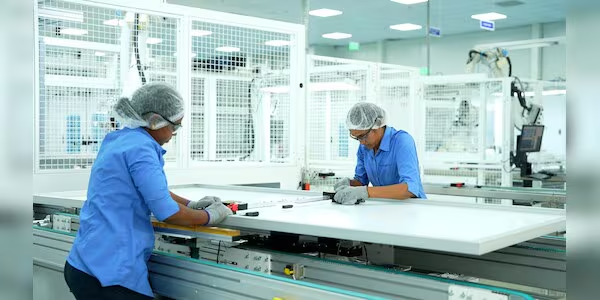In the fast-paced town of Tirunelveli, Tamil Nadu, a revolution is happening quietly, led by a group of enthusiastic women at Tata Power’s solar module manufacturing plant. Here, 80% of the employees are women, going against norms and charting the course for India’s green energy revolution. These women are not just employees; they are pioneers in an industry that is pivotal to India’s sustainable future.
From Tamil Nadu to Maharashtra
The solar panels made by these women in Tirunelveli are reaching Maharashtra, i.e., to drive the Chief Minister’s Solar Agriculture Feeder Scheme. The scheme will give cheaper solar power to farmers, enhancing farm productivity and sustainability. The modules being made at Tirunelveli are under a 300 MW supply pact with MahaGenco, exhibiting a stunning synergy of two states for one green objective.
Empowerment through Education
Their journey from the traditional kind of work to being solar panel producers is a six-week stint of tough training. By it, they are made capable to drive top-of-the-line machinery, familiarize themselves with AI, and work with robots. “We give them a high-intensity six-week training program which puts them on a pedestal as far as handling advanced machinery, AI, and robotics is concerned,” says the head honcho of Tata Power. This training not only prepares them but also enables them to make the best solar panels.
The effect of this program is not simply one of pure jobs. It’s a chance to empower women from below-average backgrounds to turn into top performers within an industry that is leading the drive for technological innovations and environmental sensitivity. This factory cares about its employees with extensive safety and health programs, such as women’s programs, pre-medical checkups, medical vans, and night shift transport arrangements.
A Dual Advantage
“It is a double benefit for the govt—empowering the women of Tamil Nadu for the solar panels and offering low-cost solar power to the farmers of Maharashtra,” stated another Tata Power spokesperson. That sentence sums up the mission of the project – it’s not merely about profit or greenery cost savings; it’s about empowering and uniting states by means of technology and empowerment.
Investment in the Future
Tata Power Renewable Energy Ltd (TPREL) has invested close to Rs 4,300 crore in setting up this plant in Tirunelveli. Such an investment is a reflection of confidence in women and the future of solar power in India. In running and maintaining sophisticated systems, they are actually leading innovation and excellence and setting the standard for others to emulate.
This tale of Tamil Nadu women producing solar panels for farmers in Maharashtra is not only an industrial tale but one of empowerment, sustainability, and inter-state cooperation. It illustrates how investing in people, particularly women, can be revolutionary, not only in their lives but in the larger objective of a greener, more sustainable India.

